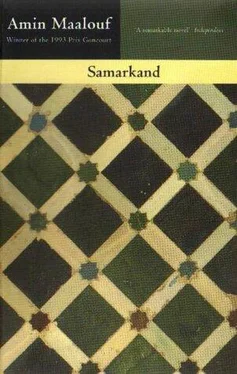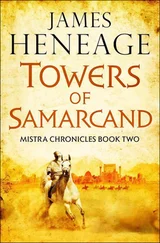‘I did not say that. Crying is not a recipe for anything. Nor is it a skill. It is simply a naked, naive and pathetic gesture. No one should be forced to shed tears. The only important thing is not to scorn other peoples’ tragedy. When they saw me crying, when they saw that I had thrown off the sovereign indifference of a foreigner, they came to tell me confidentially that crying serves no purpose and that Persia does not need any extra mourners and that the best I could do would be to provide the children of Tabriz with an adequate education.’
‘Wise words. I was going to tell you the same thing.’
‘Except that if I had not cried, they never would have come to talk to me. If they had not seen me crying, they would never have let me tell the pupils that this Shah was rotten and that the religious chiefs of Tabriz were hardly any better!’
‘Did you say that in class?’
‘Yes, I said that. This young beardless American, this young teacher at the Presbyterian Mission denounced both the crown and the turban and my students agreed with him. So did their parents. Only the reverend was outraged.’
Seeing that I was perplexed he added:
‘I have also spoken to the boys about Khayyam. I told them that millions of Americans and Europeans had made his Rubaiyaat their bedside book and I made them learn FitzGerald’s verses by heart. The next day, a grandfather came to see me. He was very moved by what his grandson had told him and he said: ‘We too have great respect for the American poets!’ Naturally he was completely unable to name a single one, but that makes no difference. It was his way of expressing his pride and gratitude. Unfortunately not all the parents reacted in the same way. One of them came to complain to me. In the pastor’s presence he yelled at me: ‘Khayyam was a drunkard and an impious man!’ I replied: ‘By saying that you are not insulting Khayyam but praising drunkenness and ungodliness!’ The reverend almost choked on the spot.’
Howard laughed like a child. He was incorrigible and disarming.
‘So you hail everything they accuse you of! Might you also be a “son of Adam”?’
‘Did the reverend tell you that too? I have the impression that you both spoke a great deal about me.’
‘We have no one else in common.’
‘I will not hide anything from you. My conscience is as pure as that of a new-born babe. About two months ago a man came to see me. He was a huge man with a moustache, but quite timid. He asked if I could give a talk at the anjuman — the club of which he was a member and you will never guess on what subject! On Darwin’s theory! I found the matter amusing and touching, given the atmosphere of political upheaval which reigns in this country, and I accepted. I gathered together everything I could lay my hands on about Darwin. I set out the theories of his detractors. I think that my performance must have been boring, but the room was crowded and they listened to me religiously. After that I went to other meetings on more diverse subjects. There is an immense thirst for knowledge among these people. They are also the most determined Constitutionalists. Sometimes I would pass by their meeting hall to hear the latest news from Teheran. You ought to meet them, they dream of the same world as you and I.’
In the evening few stalls stayed open in the Tabriz bazaar, but the streets were alive and men were sitting around talking at the crossroads, setting up circles of wicker chairs and of kalyan pipes whose smoke was gradually displacing the thousand smells of the day. I followed close on Howard’s heels as he turned from one alley into another without a second glance; from time to time he would stop to greet the parent of one of his students, and the street urchins everywhere stopped their games and scattered as he passed.
We finally arrived in front of a gate which was almost eaten away by rust. My companion pushed it open and we went through a small overgrown garden and up to a mud-brick house whose door, after seven raps, opened creaking on to a huge room which was lit up by a row of storm lamps hung from the ceiling and which a draught of air was swaying ceaselessly. The people present must have been used to it, but I very quickly felt as if I was on board a flimsy raft. I could no longer focus on anyone’s face and felt the need to lie down as soon as possible and close my eyes for a few moments. Baskerville was not unknown at the ‘sons of Adam’ meeting — he caused quite a stir when he walked in and as I had accompanied him I also had the right to some fraternal embraces which were duly redoubled when Howard revealed that his arrival in Persia was partly due to me.
When I thought it was time for me to sit down against a wall, a large man stood up at the end of the room. He had a long white cape draped over his shoulders which set him apart from the others as the most eminent person in the meeting. He took a step toward me:
‘Benjamin!’
I stood up again, took two steps and rubbed my eyes. ‘Fazel!’ We fell into each other’s arms with an oath of surprise.
‘Mr Lesage was a friend of Sayyid Jamaladin!’
Immediately I stopped being a distinguished visitor and became an historic monument, or even a religious relic. People came up to me with awe, which was quite embarrassing.
I presented Howard to Fazel. They knew each other only by reputation. Fazel had not been to Tabriz for more than a year, even though it was his birthplace. Moreover, there was something unusual and unsettling about the whole evening, together with Fazel being there within those flaking walls and under those dancing lights. Was he not one of the leaders of the democratic party in parliament, a pillar of the Constitutional Revolution? Was this the moment for him to be away from the capital? These were the questions which I put to him. He appeared embarrassed. However, I had spoken quietly in French. He looked furtively at the men next to him, and then by way of an answer he said, ‘Where are you staying?’
‘In the caravansary in the Armenian quarter.’
‘I shall come to see you during the night.’
Toward midnight we met again, six of us, in my room. There were Baskerville, myself, Fazel and three of his companions whom he introduced hurriedly for reasons of secrecy, only by their first names.
‘You asked at the anjuman why I was here and not in Teheran. Well, it is because the capital is already lost as far as the constitution goes. I could not state it in these terms to thirty people, I would have caused panic. But that is the truth.’
We were all too stunned to react. He explained:
‘Two weeks ago a journalist from St Petersberg came to see me. He was the correspondent of Ryesh. His name is Panoff but he writes under the pseudonym “Tané”.’
I had heard about him and his articles were often quoted in the London press.
‘He is a social democrat,’ Fazel continued, ‘and an enemy of Tsarism but when he arrived in Teheran some months ago he managed to hide his beliefs, worked his way into the Russian legation, and by some chance or other or even by some plan, he managed to lay his hands on some compromising documents including a project for a coup d’état which the Cossacks would carry out in order to re-impose an absolute monarchy. It was all written down in black and white. The underworld was to be given free rein in the bazaar in order to sap the merchants’ confidence in the new regime, and some religious chiefs were to address petitions to the Shah asking him to invalidate the constitution by reason of its being against Islam. Naturally Panoff was taking a risk in bringing me those documents. I thanked him for them and immediately asked for an extraordinary meeting of Parliament. Having exposed the facts in detail, I demanded that the Shah be dismissed and replaced by one of his young sons, that the Cossack brigade be broken up and the clerics incriminated in the documents be arrested. Several speakers came up to the dais to express their indignation and to support my proposals.
Читать дальше












